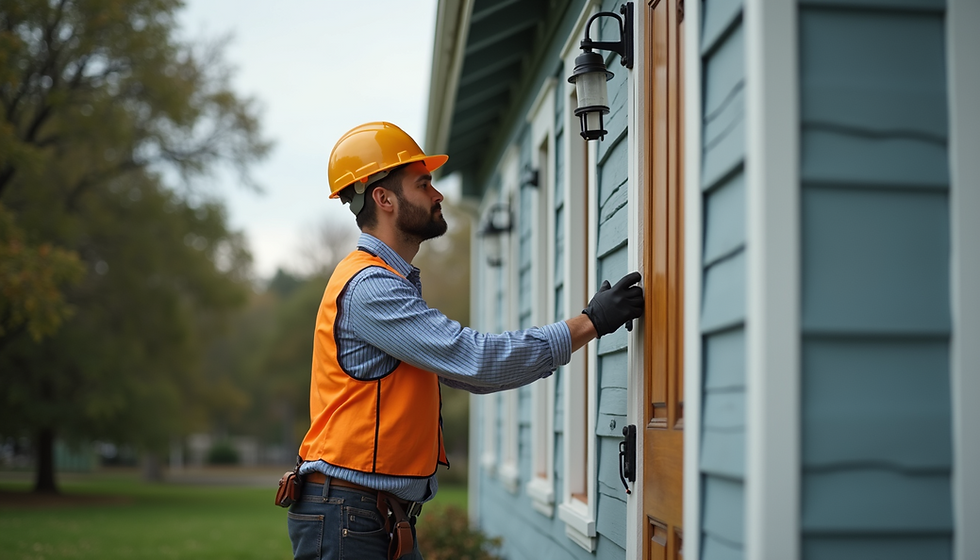Understanding the Home Inspection Process
- David Lee
- Apr 7, 2025
- 4 min read
Updated: Apr 28, 2025
When purchasing a home, it's critical to understand its condition and any potential issues that may arise. The home inspection process is a vital step in evaluating a property before making a commitment. This blog post will explain what to expect during a home inspection, its importance, and how to choose the right professional for the job.
What is a Home Inspection?
A home inspection is a thorough examination of a property's condition, typically conducted by a qualified professional known as a home inspector. This process aims to uncover any issues that could affect the property's value or safety. During the inspection, various components of the home are assessed, including:
Structural elements (foundation, roof, walls)
Plumbing systems
Electrical systems
Heating and cooling systems
Appliances
The home inspector provides a detailed report highlighting any concerns and recommending repairs or maintenance.

Why is Home Inspection Important?
Home inspections are crucial for several reasons. First, they help buyers understand what they are investing in. According to the National Association of Realtors, approximately 84% of home buyers found the inspection to be a key part of their purchasing process.
Identify Potential Problems: Home inspections can reveal issues that may not be immediately apparent, such as hidden water damage or electrical problems.
Negotiate Repairs: If significant issues are found, buyers can negotiate repairs or even reassess the price of the home.
Safety: Home inspections can identify hazards, like mold or faulty wiring, ensuring the safety of the family moving in.
Being aware of these factors can alleviate future headaches and financial burdens.
How Much Do Home Inspectors Charge Per Hour?
The cost of hiring a home inspector can vary significantly based on several factors, including the home's location, size, and age. Generally, home inspectors charge between $300 and $500 for a standard inspection, which can take 2 to 3 hours to complete. Prices can fluctuate based on:
Location: Urban areas typically have higher inspection costs than rural regions.
Experience: More experienced inspectors often charge higher fees.
Property Type: Inspecting a larger property or specialized homes (e.g., those with swimming pools or multiple systems) may increase the price.
It's important for buyers to get multiple quotes and understand what services are included in the inspection fee.

What to Expect During a Home Inspection
Understanding what happens during a home inspection can help alleviate concerns. Here’s a step-by-step breakdown of the process:
Scheduling the Inspection: Once the buyer's team is ready, an inspection is scheduled. It’s best to attend, allowing firsthand knowledge of the findings.
Examination: The inspector will examine the property thoroughly. This includes:
Looking for visible cracks or damages in the foundation
Checking roofs for wear or missing shingles
Testing the plumbing and electrical systems
Documentation: After the visual inspection, the inspector will document findings in a detailed report, typically containing photographs for reference.
Reviewing the Report: The inspector will review the report with the buyer or their representative, explaining any findings and answering questions.
This transparent process ensures that buyers are informed and equipped to make educated decisions regarding their potential property investment.
Choosing the Right Home Inspector
Selecting the right home inspector is just as crucial as the inspection itself. Here are several tips to ensure you select a qualified professional:
Check Credentials: Ensure the inspector is properly licensed and insured. Many states require inspectors to pass specific exams.
Experience: Look for someone with years of experience or specialization in inspecting homes similar to yours.
Reviews and References: Read online reviews and ask for references from previous clients. A reputable inspector should have positive feedback highlighting their thoroughness and expertise.
Sample Reports: Ask for a sample inspection report. This will give you a sense of the level of detail and clarity of the inspector's findings.
Finding a qualified home inspector will increase your confidence in the inspection process.

What Happens After the Inspection?
Following the inspection, the next steps will typically involve reviewing the inspection report and making decisions based on the findings. Here is what can occur:
Negotiation: If significant issues are found, the buyer can negotiate with the seller for repairs or price reductions.
Deciding on Repairs: If the buyer agrees to cover certain repairs, they can plan and budget accordingly.
Final Decision: Depending on the findings, the buyer must decide whether to proceed with the purchase, renegotiate, or walk away from the deal.
The inspection report is a crucial document that can heavily influence the buyer's decision-making process.
Final Thoughts
The home inspection process plays an essential role in the journey of purchasing a property. Understanding its significance, knowing what to expect, and selecting a qualified professional can empower buyers and safeguard their investment. With the right knowledge, you can navigate the home-buying process with confidence.
In the end, thorough research and preparation can lead to an informed purchase, free from unexpected issues. Your dream home can become a reality, with the home inspection facilitating that journey. So whether you're a first-time buyer or looking to invest, don’t overlook the importance of a home inspection.https://g.co/kgs/vbVhfdm









Comments